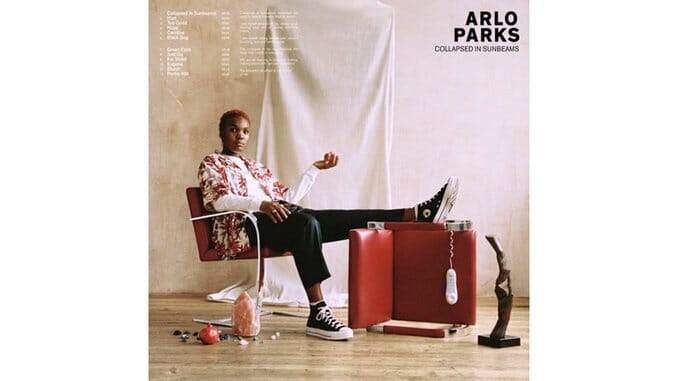Arlo Parks has already accomplished one of her biggest goals. The 19-year-old British musician, born Anaïs Oluwatoyin Estelle Marinho, has said that she writes her songs “to feel both universal and hyper-specific.” The high-profile fans—Phoebe Bridgers, Billie Eilish, Michelle Obama—whom Parks has accrued since her 2018 emergence certainly attest to her music’s broad relatability, and her music itself displays her talent for intimate, you-had-to-be-there details and unyielding, wise-beyond-her-years empathy.
On Parks’ long-awaited debut album Collapsed in Sunbeams, her narratives remain vivid and often crushing. Likewise intact is her vibrant fusion of rock, jazz, folk and hip-hop, a combination both dedicated to her idols Frank Ocean and Radiohead (she namechecks Thom Yorke on “Too Good”) and sprinkled with a blueness distinctly her own. Her sound is compelling enough that, even when her lyrics regress into platitudes, her music remains stirring and intense.
Parks’ strength lies in how deftly she interweaves broad human emotions with individual memories and aching melodies. On “Caroline,” she narrates a couple’s fight, transforming their melodrama into a treatise on romantic desperation and collapse, and the chorus’s layered vocals and reverberating midtempo guitars tremendously amplify the sadness. A detailed tale of a character’s alcoholism and trauma grounds the verses of “Hurt,” and the chorus’s sax-laced cry of support is straightforwardly gutting: “Just know it won’t hurt so much forever.” The stark intricacies of a friend’s depression guide the tender “Black Dog,” on which folk strums, starry pianos and consistent percussion underlie what might be Parks’ thesis: “It’s so cruel what your mind can do for no reason.”
Parks sings “Black Dog” entirely in first-person, whereas on “Caroline” and “Hurt,” she hops between points of view. Rare is the songwriter whose point of view so largely determines her songs’ power, but throughout Collapsed in Sunbeams, Parks’ perspective shifts prove unignorable. On the Clairo-backed, sunlit “Green Eyes,” she lists a partner’s most painful memories, and by the chorus, she’s directly imploring this ex to ignore others’ cruel comments and “Trust how you feel inside / And shine.” The shift from Parks talking about her ex to her talking to them is as unmissable as it is powerful.
A similar switch occurs during the especially jazzy “Hope,” on which a depressed friend is initially the focus before Parks goes first-person for the chorus. Here, the perspective shift somewhat sinks the high stakes, as the chorus is built on unusually run-of-the-mill lyrics for such an insightful writer: “You’re not alone / Like you think you are / We all have scars / I know it’s hard.” The ache in Parks’ voice and pianos ensure that the music remains arresting, but a close listen to her actual words dulls the devastation. A similar contrast emerges on “For Violet,” on which bleary and trip-hop-indebted music can’t entirely resuscitate a cloying chorus. As Parks sings “It feels like nothing changes, and I can’t do this,” she loses sight of her foundational specificity, especially since it’s never entirely clear whether it’s Parks or her grieving partner who’s on the verge of giving up.
Parks relies on platitudes at most in passing—more often, her talents for hooks, specificity and relatability take center stage, especially when she writes about past relationships. She excavates all the lows of a relationship on the verses of funky jazz-meets-reggae bop “Too Good,” and atop the bright strut of “Just Go”, she resists an ex who hasn’t changed. Both situations are familiar to the vast majority of listeners, yet they’re undoubtedly Parks’ own experiences (and they’re both nestled amidst Collapsed’s only two upbeat songs).
Parks most dazzlingly recounts a we’ve-all-been-there old flame on “Eugene,” a tale of unreciprocated young love told with a distinctly queer voice. Her account of accidentally falling in love with her best friend is rife with details, including a Sylvia Plath mention. Notably, this namedrop is the only one on Collapsed that bolsters the plot rather than feeling strangely out of place—the Nujabes and Jai Paul mentions on “For Violet” and “Hurt,” respectively, sound more like Parks going for cool kid points than adding more meaning to her stories. Regardless, the equally quiet, active and complex blues-folk arrangement of “Eugene” makes her words sting like salt on an open wound.
The narrative of “Eugene” is only a degree removed from the poetry of Parks’ hero Frank Ocean, who wrote the following in his landmark 2012 coming-out post to describe a barely reciprocated young queer love: “Imagine being thrown from a cliff.” Ocean captured his experience and pain in terms anyone could understand, and his optimism was similarly candid: “I finally feel like a free man.” Collapsed in Sunbeams presents Parks’ baby steps toward this same liberation, and the path she takes is wide enough, if a bit uneven, for everyone to join.
Sometimes, Max Freedman sits and writes about music, and sometimes he just sits. Follow him on Twitter, where he has been hailed as “an incredible person with an incredibly bad internet connection.”
